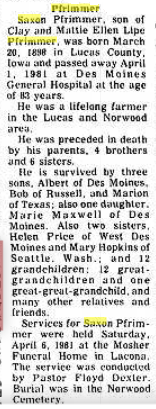From the Chariton Leader, October 26, 1954.
One of the few men in recorded history to receive their name in honor of a period in world history, Anglo Saxon Pfrimmer was a lifelong resident of Lucas County, Iowa, where he was a farmer and prominent citizen. Undoubtedly one of the more intriguing names to be featured here in recent months, Pfrimmer earns a spot here on the site due to his being a two-time candidate for the Iowa State House of Representatives in the early 1950s, running as a Democrat. One of twelve children born to Albert Clay (1860-1923) and Martha Ellen (Lipe) Pfrimmer (1866-1941), Anglo Saxon Pfrimmer was born in Lucas County on March 20, 1898.
Bestowed the names Anglo Saxon upon his birth, the reasons as to why he received this name remain unknown. Anglo Saxons (a historic term) describes the group of Germanic people that resided in what is now Great Britain beginning in the 5th century and is also used as the name of a historical period in that area dating from Roman Occupation to the Norman Conquest during the 11th century.
Referred to by most sources as Saxon Pfrimmer, little is known of his early life or education, excepting notice of his being a student at the Wren Hill school. In 1917 Pfrimmer left his native county for a brief residence in Minnesota, where he was employed on a farm. He married in Chariton, Iowa on January 31, 1921, to Edna Roe (1903-1995), to whom he was wed for sixty years. This lengthy union saw the births of five children, Sherman (1922-1998), Robert (1924-1991), Francis Marion (1926-2011), Macel Marie (1932-2010), and a daughter who died in infancy in 1925. Following their marriage, Pfrimmer and wife resided on his farm near Ottercreek Township, and he would follow farming for the remainder of his life. In 1941 he purchased a "farm of 80 acres from his mother's estate" and took up residence there, and would later purchase an additional forty acres of farmland.
In addition to operating these farms, Saxon Pfrimmer gained distinction in Lucas County agricultural groups, being head of the Ottercreek 4-H Club, a director of the Lucas County Purebred Swine Breeders Association, and a member of the Lucas County Sheep Improvement Association. In 1952 Pfrimmer made his first run for political office, announcing his candidacy for the Iowa House of Representatives from Lucas County. Following his win in the June 2nd Democratic primary (where he polled 279 votes) Pfrimmer faced off against Republican nominee Raymond T. Pim, and throughout the latter part of 1952 election advertisements for Pfrimmer appeared in various Lucas County newspapers.
From the Chariton Leader, October 21, 1952.
From the Chariton Leader, June 15, 1954.
When Lucas County voters went to the polls on November 4, 1952, it was Republican Raymond Pim who emerged triumphant, polling 3, 744 votes to Saxon Pfrimmer's 2,154. Not one to let a loss get the best of him, Pfrimmer announced in early 1954 that he'd be seeking the Democratic nomination for state representative for the second time, and his candidacy was profiled in a small write up in the January 26th Chariton Leader (shown below). Along with his background as a farmer and his previous candidacy, Pfrimmer would state that:
"I don't belive the people of Iowa approve of the actions of the last legislature. Certainly we can't continue to live on the state surplus as we are now--it's dangerously low. If elected I pledge my best efforts to represent all the people of Lucas County."
From the Chariton Leader, January 26, 1954.
In a repeat of the 1952 contest, Pfrimmer's Republican opponent was again Raymond Pim, running for reelection. Unfortunately for Pfrimmer, the vote count on November 2nd again brought defeat, with Pim garnering 2, 427 to his own total of 1, 908. Following his loss, Pfrimmer returned to farming and in January 1957 was injured in a car accident in Lucas County that necessitated brief hospitalization for "head lacerations and shock." He continued to farm and reside in Lucas County until his death at a Des Moines hospital on April 1, 1981, at age 83. He was survived by his four children and wife Edna, who, following her death aged 92 in 1995, was interred alongside her husband at the Norwood Cemetery in Norwood, Iowa.
From the Chariton Herald-Patriot, April 9, 1981.


























